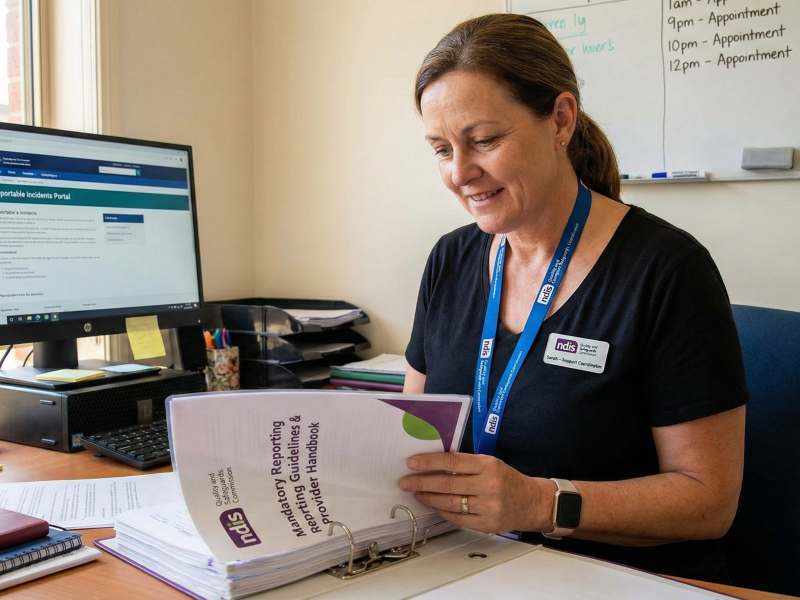The National Disability Insurance Scheme (NDIS) plays a vital role in supporting Australians with disabilities. Becoming an NDIS Registered Provider allows you to deliver services that are funded through the Scheme, opening the door to supporting a wider range of Participants.
One of the most common questions from new Providers is, “How long does it take to become NDIS registered?” The answer depends on several factors, including your organisation’s preparedness, the types of supports and services you intend to offer, and the complexity of the NDIS audit process.
In this article, we explore the NDIS registration timeline, what to expect during the Application preparation and audit stages, typical costs involved, and practical tips to help you submit a successful NDIS Provider Registration Application.
Roadmap to NDIS Registration Process with Timelines
1. Understanding the NDIS Commission Requirements (1-2 weeks)
Before starting your Application, it’s important to become familiar with the obligations set out by the NDIS Quality and Safeguards Commission. This includes gaining a clear understanding of the NDIS Practice Standards, the NDIS Code of Conduct, and the responsibilities of NDIS Providers. A solid understanding here will help you navigate the next steps with confidence.
2. Establishing Your Business Structure (1 week)
To be eligible for registration, you must operate under a recognised business structure; whether as a sole trader, partnership, or company. You’ll need an Australian Business Number (ABN), relevant insurances, and clear definitions of worker roles and responsibilities. Ensuring that your structure and documentation align with NDIS Commission requirements is critical at this early stage.
3. Lodging the Application (1 week)
Your NDIS Provider Registration Application is submitted through the NDIS Commission Portal. You will be asked to enter details about your organisation, the registration groups you’re applying for, and complete a self-assessment against the NDIS Practice Standards. At this point, you’ll upload supporting documents as part of your Application. Submitting a thorough and accurate Application can reduce the likelihood of delays.
4. NDIS Audit Preparation and Completion (4-8 weeks)
Following your Application submission, you must engage an NDIS-approved auditor. Depending on your services, you’ll either undergo a Verification Audit or a Certification Audit. This process includes document reviews, interviews, and evaluation of your systems and processes. Effective preparation is essential to ensure you meet all compliance requirements.
5. NDIS Commission Application Review (6-12 weeks)
Once your audit is completed, the auditor submits their findings to the NDIS Commission in the form of an audit report. The Commission then begins its review of your NDIS Provider Registration Application including the audit outcomes and all supporting documentation. This review period can take anywhere from 6 to 12 weeks. The timeline can vary based on the complexity of the services you are registering to provide, the completeness of your Application, and whether the Commission requires additional information. Delays may occur if your submission lacks required details or if further evidence is needed.
6. Getting Your Outcome (Can be instant!)
After the review is complete, you’ll receive formal notification of the outcome. If successful, your organisation will be listed on the NDIS Provider Finder. If unsuccessful, the Commission will provide feedback, and you may have the opportunity to respond, appeal, or reapply once identified gaps are addressed.
Total Estimated Time: 3 to 6 Months
Want to Attract More NDIS Clients?
Get expert advice on how to market your services, connect with clients, and grow your practice.
How Much Does It Cost to Become NDIS Registered?
The cost of becoming an NDIS Registered Provider varies depending on the nature and scale of your business, as well as the types of supports you intend to deliver. While some costs are fixed, others will depend on the complexity of your registration. Here’s a breakdown of the typical expenses you can expect during the NDIS Provider Registration process.
NDIS Audit Fees
This is the most significant cost in the registration journey. Audit fees can range from approximately $1,500 to $10,000. The price is influenced by whether you are undergoing a Verification Audit (typically required for low-risk registration groups) or a Certification Audit (required for medium to higher-risk or more complex services).
Policy and Documentation Development
To meet the NDIS Practice Standards, you may need professionally developed policies and procedures. While some Providers write these themselves, many engage experts to ensure full compliance. This can add to your upfront investment but may help streamline the Application and audit process.
Insurance and Administrative Fees
NDIS Registered Providers must hold current public liability insurance, professional indemnity insurance, and workers’ compensation coverage. These are essential compliance requirements and contribute to the overall cost of registration. Additional costs may include business registration fees, document management systems, and employee onboarding.
Providers offering low-risk supports such as transportation or gardening typically face lower overall costs. In contrast, organisations delivering high-risk or complex services, such as High Intensity Daily Personal Activities or Behaviour Supports, may incur higher audit and compliance expenses.
How to Ensure a Successful NDIS Registration Application
In order to enhance your prospects of having a smooth and successful Application preparation and compliance are key. Here are some important steps to help you stay on track:
- Invest in High Quality Policy Development: Ensure that all required policies and procedures are developed in line with the NDIS Practice Standards. Key documents include your Incident Management Policy, Risk Management Policy and Feedback and Complaints Management Policy.
- Understand NDIS Audit Requirements: Choose an experienced, NDIS-approved auditor early in the process. Be clear on whether your service type requires a Verification or Certification Audit. Your internal systems should be audit-ready, and your team should understand their responsibilities under the NDIS Code of Conduct and Practice Standards.
- Stay Organised: Keep records of all information submitted in your NDIS Registration Application. Document your communications with auditors and the NDIS Commission, and track every stage of the process to avoid overlooking any steps or deadlines.
- Seek Professional Assistance: Many Providers benefit from engaging an NDIS Consultant, such as Avaana. These professionals can assist with policy development, Application reviews, and audit preparation, helping to minimise delays and improve your chances of a successful outcome.
Things to Consider When Doing Your NDIS Registration Application
- Clarity of Service Scope: Clearly define the services you plan to offer so you’re assessed against the correct NDIS Practice Standards and assigned the right type of audit.
- Staff Readiness: Ensure Workers hold valid qualifications and checks required for their role
- Documentation Quality: Make sure your policies and procedures are drafted according to the NDIS Practice Standards, and tailored to be specific to your business. Generic templates purchased off the shelf are often flagged during audit.
- Compliance with NDIS Code of Conduct: From the moment you begin your Application, you’re expected to follow the NDIS Code of Conduct as a reflection of your Application for Provider Registration.
- IT and Data Systems: Demonstrate that you use secure and reliable systems to store Participant information and manage service delivery. A simple, well-organised client management system, such as ShiftCare, can strengthen your Application.
Delays in Becoming an NDIS Provider
Most Applicants experience delays. Common reasons include:
- Incomplete Applications: Missing documents or unclear responses in the self-assessment can hold up the process.
- Wrong Audit type selected: Choosing verification instead of certification (or vice versa) leads to delays and rework.
- Poor Audit preparation: Lack of training records, unclear business processes, or missing policies can result in non-conformities.
- Auditor or Commission delays: High demand can slow down reviews and decision-making by auditors and the NDIS Commission.
- Lack of communication: Not responding to requests for more information can stall your Application completely.
Preempting these problems and solving them early on can help your registration process go much faster.
Referrals Start With Reputation – We’ll Help You Build Both
From networking tips to service refinement, we guide NDIS providers toward lasting impact.
Conclusion
Becoming an NDIS Registered Provider is a powerful step toward delivering meaningful and high-quality support to people with disability. While the process involves detailed preparation and compliance, it becomes far more manageable with a clear plan and the right guidance. Whether you’re starting out as a sole trader or expanding a service, understanding the NDIS Commission’s expectations is key to success. The registration journey can lead to a secure and fulfilling future, giving you the opportunity to grow your business and reach more Participants. With Avaana’s expert support in areas like policy creation and audit preparation, you can move through the process with clarity and confidence.
FAQs
1. How long does it take to become an NDIS Provider?
Becoming a Registered NDIS Provider usually takes around 3 to 6 months, but this can vary depending on the type of supports you offer and how smoothly your Application and audit go. If you’re offering low-risk services and have your documents, insurance, and policies ready, the process can be quicker. Delays often happen due to incomplete Applications or audit issues, so being well-prepared can significantly reduce the time it takes.
2. What is required to register as an NDIS Provider?
To Register as an NDIS Provider, you’ll need to organise business details, such as your ABN and business structure, along with insurance certificates for public liability and professional indemnity. You must also prepare key policies and procedures including incident management, complaints handling, privacy, and risk management. Depending on the supports you offer, extra documentation may be required, especially for more complex or high-risk services.
3. Can my Application be delayed during the process?
Yes, there can be delays if your required supporting documents are not ready by the time you lodge your Application, non-conformities are included in audit reports, or there is a general Application backlog with the NDIS Commission.
4. How much does NDIS Registration cost?
The Application has associated mandatory auditing, however those audit fees can vary. Fees can range from $1,500 for a basic verification audit to more than $10,000 for a complex certification audit. In addition to audit fees, you should also factor in the cost of insurance, training, policy development, and potentially support from consultants. Planning your budget early helps you stay on track and avoid unexpected costs during the registration process.


